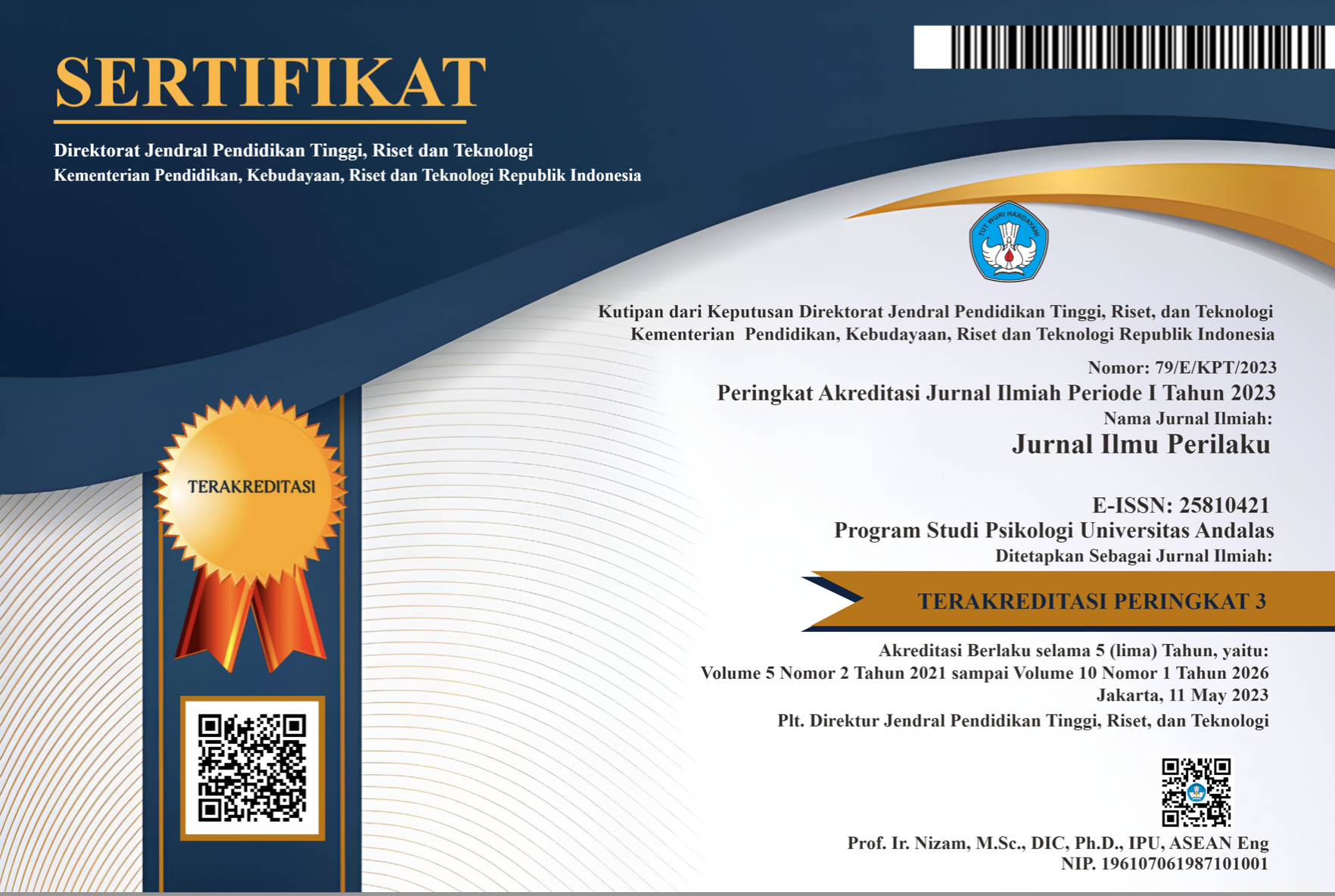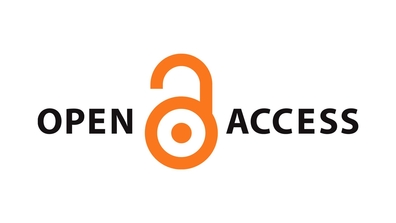Pengaruh Career Adaptability terhadap Kesiapan Kerja Mahasiswa pada Masa Pandemi
Abstract
The COVID-19 pandemic has had an impact on the high rate of unemployment, which may indicate the low level of work readiness especially for those who will enter the realm of work after completing their education. However, due to the limited research investigating this topic, the present study aimed to examine the effect of career adaptability on the work readiness of final year students during the pandemic. A total of 182 students were recruited through quota sampling to complete Career Adaptability and Work Readiness scales. The regression analysis results showed that career adaptability had a significant effect on work readiness. Career adaptability contributes 60% to the students’ work readiness. It indicates that career adaptability is an important aspect that must be possessed by students to develop their work readiness. Students with career adaptability have concerns about their future careers, so they would be better prepared to face the work conditions during pandemics.
Downloads
References
Aucejo, E. M., French, J., Araya, M. P. U., & Zafar, B. (2020). The impact of COVID-19 on student experiences and expectations: Evidence from a survey. Journal of public economics, 191, 1-15. https://doi.org/10.1016/j.jpubeco.2020.104271
Azwar, S. (2010). Reliabilitas dan Validitas (Edisi ke-3). Pustaka Pelajar.
Azwar, S. (2012). Penyusunan skala psikologi (Edisi ke-2). Pustaka Pelajar.
Azwar, S. (2017). Metode Penelitian Psikologi (Edisi ke-2). Pustaka Pelajar.
Badan Pusat Statistik. (2020). Analisis hasil survei dampak Covid-19 terhadap pelaku usaha. https://www.bps.go.id/publication/2020/09/15/9efe2fbda7d674c09ffd0978/analisis-hasil-survei-dampak-covid-19-terhadap-pelaku-usaha.html
Badan Pusat Statistik (BPS). (2021). Tingkat pengangguran terbuka (Tpt). BPS.go.id. https://www.bps.go.id/pressrelease/2021/05/05/1815/februari-2021--tingkat-pengangguran-terbuka--tpt--sebesar-6-26-persen.html
Beaton, D. E., Claire, B., Guillemin, F., & Ferraz, M. B. (2000). Guidelines for the process of cross-cultural adaptation of self-report measures. Spine, 25(24), 3186–3191. https://doi.org/https://doi.org/10.1097/00007632-200012150-00014
Brown, S. D., & Lent, R. W. (2020). Career development and counseling: Putting theory and research to work. John Wiley & Sons.
Cohen, L., Manion, L., & Morrison, K. (2018). Research methods in education (8th Ed). Routledge. https://doi.org/10.4324/9781315456539
Fataron, Z. A., & Sijabat, R. (2019). The pathway of strengthening the working readiness: A study on graduate students of Islamic Economics and Business Faculty of UIN Walisongo Semarang. Jurnal Pendidikan Vokasi, 9(3), 258–269. https://doi.org/10.21831/jpv.v9i3.26948
Hamzah, S. R., Kai Le, K., & Musa, S. N. S. (2021). The mediating role of career decision self-efficacy on the relationship of career emotional intelligence and self-esteem with career adaptability among university students. International Journal of Adolescence and Youth, 26(1), 83–93. https://doi.org/10.1080/02673843.2021.1886952
Kurniawan, M. U. (2020). Analisis kesiapan kerja mahasiswa di era revolusi industri 4.0 ditinjau dari soft skills mahasiswa. EQUILIBRIUM : Jurnal Ilmiah Ekonomi dan Pembelajarannya, 8(2), 109. https://doi.org/10.25273/equilibrium.v8i2.7108
Lakshmi, P. A. V., & Sonata, S. (2021). Manfaat career adaptability dan job crafting pada kesuksesan karir pekerja indonesia dalam masa pandemi. Psikoislamika : Jurnal Psikologi dan Psikologi Islam, 18(1), 145–162. https://doi.org/10.18860/psikoislamika.v18i1.11796
Lisá, E., Hennelová, K., & Newman, D. (2019). Comparison between employers’ and students’ expectations in respect of employability skills of university graduates. International Journal of Work-Integrated Learning, 20(1), 71–82.
Monteiro, S., Taveira, M. do C., & Almeida, L. (2019). Career adaptability and university-to-work transition: Effects on graduates’ employment status. Education and Training, 61(9), 1187–1199. https://doi.org/10.1108/ET-10-2018-0206
Pool, L. D. (2017). Graduate employability in context. Graduate Employability in Context, 317–338. https://doi.org/10.1057/978-1-137-57168-7
Pool, L. D., & Sewell, P. (2007). The key to employability: Developing a practical model of graduate employability. Education and Training, 49(4), 277–289. https://doi.org/10.1108/00400910710754435
Prikshat, V., Nankervis, A., Burgess, J., & Dhakal, S. (2019). Conceptualising graduate work-readiness: theories, concepts and implications for practice and research. Springer Singapore. https://doi.org/10.1007/978-981-13-0974-8_2
Qomariyah, L., & Febriyanti, M. N. (2021). Exploration of the factors of work readiness during the pandemic Covid-19. Proceedings of Psychology in Individual and Community Empowerment to Build New Normal Lifestyle, 2, 153-160. https://doi.org/10.30595/pssh.v2i.121
Rahman, M. F. (2018). Hubungan keterampilan kerja dengan kesiapan kerja mahasiswa Politeknik Kesehatan Samarinda dalam menghadapi MEA. Psikoborneo: Jurnal Ilmiah Psikologi, 6(2), 266–278.
Roslan, S., Ping, W. S., Sulaiman, T., Jalil, H. A., & Yan-Li, S. (2020). Psychometric properties of graduate employability instruments among Malaysian higher education institution students. Universal Journal of Educational Research, 8(1A), 164–178. https://doi.org/10.13189/ujer.2020.081321
Rudolph, C. W., Lavigne, K. N., Katz, I. M., & Zacher, H. (2017). Linking dimensions of career adaptability to adaptation results: A meta-analysis. Journal of Vocational Behavior, 102, 151–173. https://doi.org/10.1016/j.jvb.2017.06.003
Santilli, S., Grossen, S., & Nota, L. (2020). Career adaptability, resilience, and life satisfaction among Italian and Belgian middle school students. Career Development Quarterly, 68(3), 194–207. https://doi.org/10.1002/cdq.12231
Savickas, M. L. (1997). Career adaptability: An integrative construct for life-span, life-space theory. Career Development Quarterly, 45(3), 247–259. https://doi.org/10.1002/j.2161-0045.1997.tb00469.x
Savickas, M. L. (2012). Life design: A paradigm for career intervention in the 21st century. Journal of Counseling and Development, 90(1), 13–19. https://doi.org/10.1111/j.1556-6676.2012.00002.x
Savickas, M. L., & Porfeli, E. J. (2012). Career adapt-abilities scale: Construction, reliability, and measurement equivalence across 13 countries. Journal of Vocational Behavior, 80(3), 661–673. https://doi.org/10.1016/j.jvb.2012.01.011
Syarip, S. M., Suherman, A., & Yayat, Y. (2018). Identifikasi faktor-faktor yang mempengaruhi kesiapan kerja siswa teknik perbaikan bodi otomotif. Journal of Mechanical Engineering Education, 5(2), 261. https://doi.org/10.17509/jmee.v5i2.15197
Wijikapindho, R. A., & Hadi, C. (2021). Hubungan antara self-efficacy dengan kesiapan kerja pada mahasiswa semester akhir. Buletin Riset Psikologi Dan Kesehatan Mental, 1(2), 1313–1318.
Winterton, J., & Turner, J. J. (2019). Preparing graduates for work readiness: An overview and agenda. Education and Training, 61(5), 536–551. https://doi.org/10.1108/ET-03-2019-0044
Yorke, M. (2005). Employability in higher education: What it is – what it is not. Learning & Employability, 1, 1-24. http://doi.wiley.com/10.1002/ir.162
Zunita, M., Widiastuti, R., & Yusmansyah. (2018). Analisis kesiapan kerja mahasiswa tingkat akhir the analysis of the final-year students’ employability. Jurnal Bimbingan Konseling, 6(3), 1–15. http://jurnal.fkip.unila.ac.id/index.php/ALIB/article/view/17196
The non-commercial use of the article is governed by the Creative Commons Attribution license as currently displayed on Creative Commons Attribution-NonCommercial-ShareAlike 4.0 International License.
JIP's spirit is to disseminate articles published are as free as possible. Under the Creative Commons license, JIP permits users to copy, distribute, display, and perform the work for non-commercial purposes only. Users will also need to attribute authors and JIP on distributing works in the journal.
Please find the rights and licenses in Jurnal Ilmu Perilaku (JIP).
- License
The non-commercial use of the article will be governed by the Creative Commons Attribution license as currently displayed on Creative Commons Attribution-NonCommercial-ShareAlike 4.0 International License.
- Author’s Warranties
The author warrants that the article is original, written by stated author(s), has not been published before, contains no unlawful statements, does not infringe the rights of others, is subject to copyright that is vested exclusively in the author and free of any third party rights, and that any necessary written permissions to quote from other sources have been obtained by the author(s).
- User Rights
JIP's spirit is to disseminate articles published are as free as possible. Under the Creative Commons license, JIP permits users to copy, distribute, display, and perform the work for non-commercial purposes only. Users will also need to attribute authors and JIP on distributing works in the journal.
- Rights of Authors
Authors retain the following rights:
- Copyright, and other proprietary rights relating to the article, such as patent rights,
- The right to use the substance of the article in future own works, including lectures and books,
- The right to reproduce the article for own purposes, provided the copies are not offered for sale,
- The right to self-archive the article.
- Co-Authorship
If the article was jointly prepared by other authors, the signatory of this form warrants that he/she has been authorized by all co-authors to sign this agreement on their behalf, and agrees to inform his/her co-authors of the terms of this agreement.
- Termination
This agreement can be terminated by the author or JIP upon two months’ notice where the other party has materially breached this agreement and failed to remedy such breach within a month of being given the terminating party’s notice requesting such breach to be remedied. No breach or violation of this agreement will cause this agreement or any license granted in it to terminate automatically or affect the definition of JIP.
- Royalties
This agreement entitles the author to no royalties or other fees. To such extent as legally permissible, the author waives his or her right to collect royalties relative to the article in respect of any use of the article by JIP or its sublicensee.
- Miscellaneous
JIP will publish the article (or have it published) in the journal if the article’s editorial process is successfully completed and JIP or its sublicensee has become obligated to have the article published. JIP may conform the article to a style of punctuation, spelling, capitalization, referencing and usage that it deems appropriate. The author acknowledges that the article may be published so that it will be publicly accessible and such access will be free of charge for the readers.










